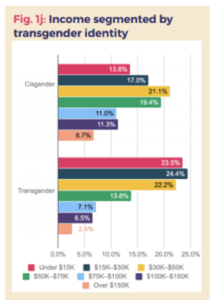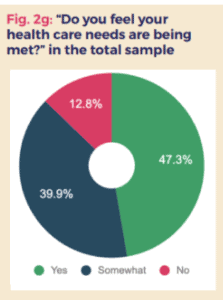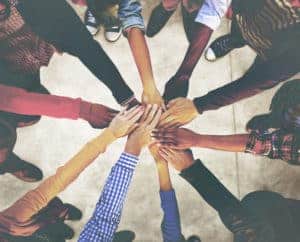Addiction is nondiscriminatory. It affects individuals from all races, ages, classes, and religions. Between 1999 and 2019, 841,000 individuals died from a drug overdose in the United States. That is approximately 115 people per day. Due to the increasing prevalence of the ongoing drug epidemic, studies have been conducted to identifying at-risk demographics. These studies have found that, while no one is insusceptible from developing an addiction, some demographics are more at risk of developing a drug addiction than others.
According to the Center for American Progress, as many as 30 percent of LGBTQ individuals report alcohol and drug abuse, while the general rate of abuse is only 9 percent. Within the LGBTQ community, transgender individuals are specifically at risk, with a reported 26 percent reporting drug or alcohol abuse. Research has shown that numerous social constructs play a large role in perpetuating addiction within the transgender and gender nonbinary communities. These constructs include social prejudice, incompetent healthcare, and targeted marketing.
Social Prejudice
Although the population exceeds 1.3 million individuals, the transgender community remains a neglected minority. These individuals face regular discrimination and are often denied basic human rights in areas such as employment, housing, and legitimacy of marriage. Those who have successfully transitioned are frequently faced with a lack of gender or relationship recognition, and statistically vulnerable to violence, incarceration, and poverty. According to a survey conducted by the Campaign for Southern Equality, 23.5 percent of transgender individuals within the sample group (approximately 5,600 respondents, total) reported annual incomes of less than $15,000, in comparison with the 13.6 percent of cisgender individuals who reported the same income.

Due to systemic prejudices, anxiety and depression rates are exponentially higher among the transgender community. The National Alliance on Mental Illness states that transgender and gender nonbinary individuals are more prone to mental illness than the general population due to this minority stress. Societal prejudice reinforces the development of mental disorders which often compels the individual to develop unhealthy coping mechanisms, such as substance abuse.
Culturally Incompetent Healthcare
Another unfortunate contribution to addiction rates among the transgender community is the inadequacy of transgender-specific healthcare. According to the Center for American Progress, adults within the LGBTQ community are twice as likely to be without health insurance coverage in comparison to the general population. When they do have access to health insurance, many employer-sponsored, Medicare, or Medicaid plans target transgender people by incorporating discriminatory provisions within the coverage plan, which, in turn, prevents them from receiving affordable, transition-related care.
Meanwhile, for those who do have adequate health coverage, they find that many medical professionals lack the cultural competency and training to provide adequate care for the transgendered. As stated in the Campaign for Southern Equality’s 2019 Southern LGBTQ Health Survey, less than half of respondents reported that they felt their health care needs are being met.

When asked about necessary medical improvements to treat the transgender and gender nonbinary population, Allison Scott of the Campaign for Southern Equality, or CSE, states that when healthcare providers request cultural training, they find that many providers have had no formal education on the subject of LGBTQ and gender identity. Allison also emphasizes a need for a diverse staff, “If I don’t see a diverse staff, especially people who may represent me and my community, I wonder: how will they get it?”.
According to the American Psychological Association, transgender individuals who have had negative experiences with health providers are likely to anticipate further discrimination, which can effectively trigger stress responses. When transgender individuals fear they have developed a substance addiction, this lack of adequate, trans-specific healthcare likely causes the addiction to go untreated, and, potentially, progress. In cases where a trans individual decides to seek professional addiction treatment, their efforts are once again discouraged due to a scarce 7.4 percent of addiction treatment programs in the United States offering specialized LGBTQ services.
Targeted Marketing
An additional, rather insidious, component actively contributing to substance abuse within the LGBTQ population is targeted marketing. Targeted marketing is when a business focuses its efforts and resources toward a specific populace that is perceived as profitable. As pillars of the LGBTQ community, social and nightlife scenes are often subject to the marketing efforts of tobacco and alcohol corporations.
Acting as a refuge for those who simply long to gather in solidarity, these establishments have fallen victim to exploitative, yet legal, marketing practices. According to the Center for American Progress, the alcohol industry, tobacco industry, and illegal drug market rely on marketing their products to LGBTQ people, who stand at high-risk for developing substance abuse as a result of the daily prejudice they experience.
These industries dabble in literary advertising as well, with tobacco companies directly advertising in regional and national LGBTQ-centric publications, using keywords such as “liberation, individualism, and acceptance,” words which the LGBTQ communities have been advocating for generations, as stated by the American Cancer Society.
How to Implement Change
As a result of injustices including, but not limited to, social prejudice, insufficient health care, and targeted marketing, the transgender and nonbinary communities are unfairly exposed to the danger of developing substance use disorders with 26 percent reporting drug or alcohol abuse.
It is evident that these discriminatory social constructs need to be addressed and corrected. The CSE’s Allison Scott explains that real change relies on targeting the root cause of this prejudice, and efforts must begin at the bottom. She urges for advocacy in passing nondiscriminatory ordinances at the city, state, and federal levels so the transgender and gender nonbinary communities have protected rights to acquire employment, culturally competent healthcare, and housing.
During this ongoing drug crisis, it is imperative that the basic human rights of our minority populations are protected, and that no individual remains especially vulnerable to the lure of addiction. If you or someone you love is struggling with addiction, there are many resources available to you. As the premier addiction treatment facility in the region, Asheville Recovery Center strives to provide the best care, suited completely to your individual needs. We also commend the following organizations for their continued efforts in the fight to secure LGBTQ rights and urge individuals facing prejudice to contact them for additional help and useful resources.







